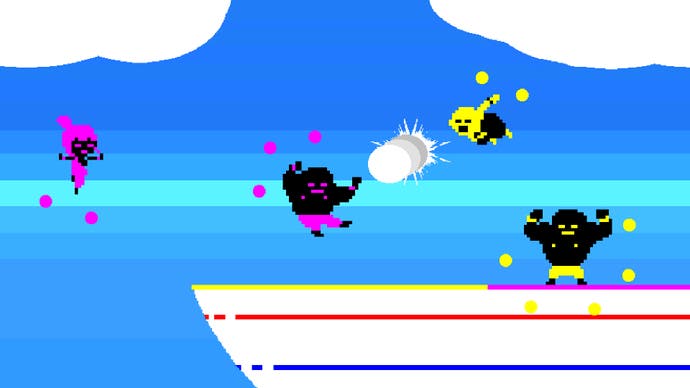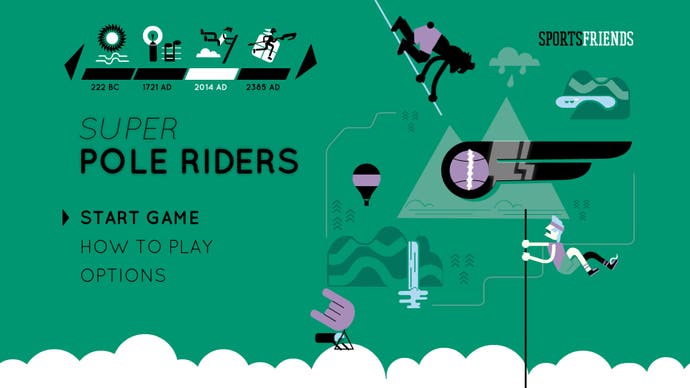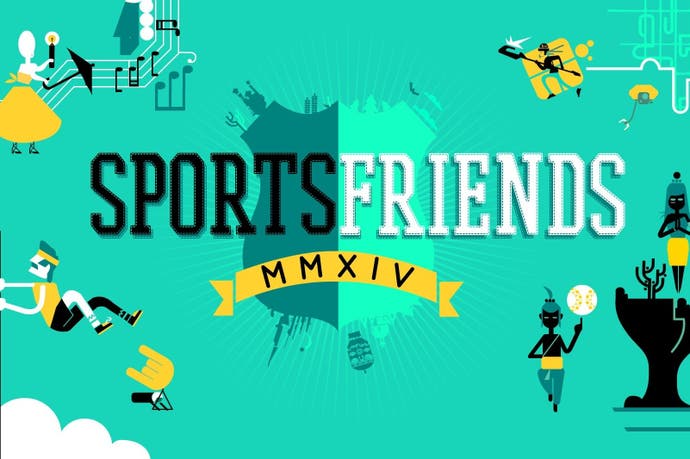Sportsfriends review
We sports.
It might seem strange for a pastime so often stigmatised for its nerdishness, but video games' defining moments have often been touched by the testosterone musk of sports. From William Higinbotham sparking a game of tennis to life on the phosphorus of his laboratory oscilloscope to the well-worn paddles of a Pong machine, and through to the swings and thrusts of Nintendo's Wii Sports, there's something primal and pure in the competitive, social element of games.
Sportsfriends, a compendium of competitive games for PC, Mac, PS4 and PS3, taps into a phenomenon that isn't exactly new, then - but it's most definitely voguish. Each of the four titles included has been the darling of exhibitions, events and club nights over the past few years, and they carry a certain hipster edge: it's there in self-conscious minimalism of the style, in the overstated buoyancy of the soundtrack and in the flat, bright colours employed across the games. Look beyond that, though, and you'll find a collection that builds upon gaming's competitive legacy in surprising, often scintillating ways.

DieGuteFabrik's Johann Sebastian Joust, arguably the headline turn with a profile well beyond what you'd expect from a game that's only been playable at a select number of events, is Sportsfriends at its most extreme. Famously jettisoning the television and a game without graphics, you and up to three friends (or six, if you're playing on PlayStation 3 or PC, where there's more bandwidth for more controllers) stand in a circle, defending your motion-sensitive controller and trying not to make any sudden movements with it, while a soundtrack speeds and slows the action.
The simple rule-set smooths over an abstract concept, though in practice it's never anything beyond weird. A friend described it best as polite wrestling, and the nobility of Bach's Brandenburg Concertos sounding off in the background makes for face-offs that are half ballroom dance and half gentlemanly duel. When it works, it works wonderfully - incongruous and bawdy, with the right crowd it can be the ultimate party game - though it's still an experience more suited to the nightclub or exhibition space than the living room. The decision to open up the game beyond the PlayStation Move controller is a welcome one, but it's a brave person who elects to play an extremely physical game in which, with DualShock 4s involved, the object is to jostle a £60 controller in your competitor's sweat-slicked hands. It's an even braver one who agrees to to face up to a small room full of their prized possessions and a throng of friends with bellyfuls of Polish lager.
Thankfully, Sportsfriends' other attractions are more suited to the sofa, where you can look to win without risking the contents of your lounge or dislocating an arm. They're still full of boisterous, scrappy humour, though. Take BaraBariBall, a lo-fi, volleyball-themed spin on Smash Bros. and a small, perfectly formed marvel. It's a sport whose rules are simple and unchanging - dunk a ball into the opposing half's pool of water and wait for it to sink to the bottom to score, while avoiding drowning yourself - and are brilliantly stretched over a series of maps and a selection of well-balanced characters.

BaraBariBall's beauty comes in its motion. You're able to chain jumps together - an ability that's slowly depleted and that can be recharged when your feet are on a solid platform. As a mechanic, it's expertly adept; fleeting bouts of flight are fraught with tension, while defending players can stick to the ground and wait for the right moment to pounce in and steal the ball, leaving the opposing player sinking to the depths. It's chaos, but the rules are defined enough for a competitive edge to bubble up and make sense of it all.
Chaos interspersed with moments of skill and beauty seems like a spot-on way of describing many sports - sports when played by enthusiastic, well-lubricated amateurs, at least - and they're elements present in excelsis in Bennett Foddy's Super Pole Riders. Like Foddy's most famous works GIRP and QWOP, a knobbly-kneed brand of physics is the fulcrum for much of the fun, and it's mixed together here with no small amount of craft.
Players each have in their possession a long, comically unwieldy pole controlled by the right stick, the aim being simply to kick a ball suspended on a line into one of two goals. From there, though, it's a blend of nonsense and grace - nonsense as the pole refuses to yield to your commands, and grace in those glorious seconds when it does, sending your player hurtling in a decorous arc that sends the ball zipping along with one well-placed kick. Underpinning it all is a neat, subversive stream of homoeroticism, where Princeton courtyards play host to lithe, lightly clothed athletes who all embrace with a lingering softness once the matches end. If it's a comment on sports culture in general, it's an obvious but well observed one.
Sportsfriends is a throwback to huddling around a Coleco Telstar, flicking through the Pong variants and finding yourself in thrall to video games for the first time

Hokra, the last of the bunch, is a highlight, and it's here that the jostling, frantic nature flowing through Sportsfriends is at its most pure. The starkness of the aesthetic helps - told with clean, substantial pixels, it looks like it's running on an Atari 2600 raised in the design schools of Scandinavia - as does the simplicity of its purpose, mixing King of the Hill with the physicality and crackling kinetics of hockey. Playable by four players split across two teams - and playable by four players only - the aim is to knock a puck into one of your own zones, slowly charging it until it's completely yours. Matches are then about teamwork and escalating drama, with different maps - and a reasonably useful level editor - adding ripples through the play.
Taken together, Sportsfriends' games are a little like a throwback to the days of being huddled around a Coleco Telstar, flicking through the Pong variants and finding yourself in thrall to video games for the very first time. The simplicity of Sportsfriends cuts both ways, lowering the barrier of entry but also entirely excluding anyone who wants to play alone - this is an offline-only, multiplayer-exclusive game, with no concessions whatsoever for the solo player.
To complain about that would be missing the point, though. Sportsfriends is a celebration of the social side of games, their ability to bring a room together in one loud, raucous moment and how they're so much more fun when enjoyed with company. Alongside like-minded titles such as Towerfall and Nidhogg, this compilation is a pleasant reminder of that power - and, just like its companions, Sportsfriends represents video games at their very, very best.

